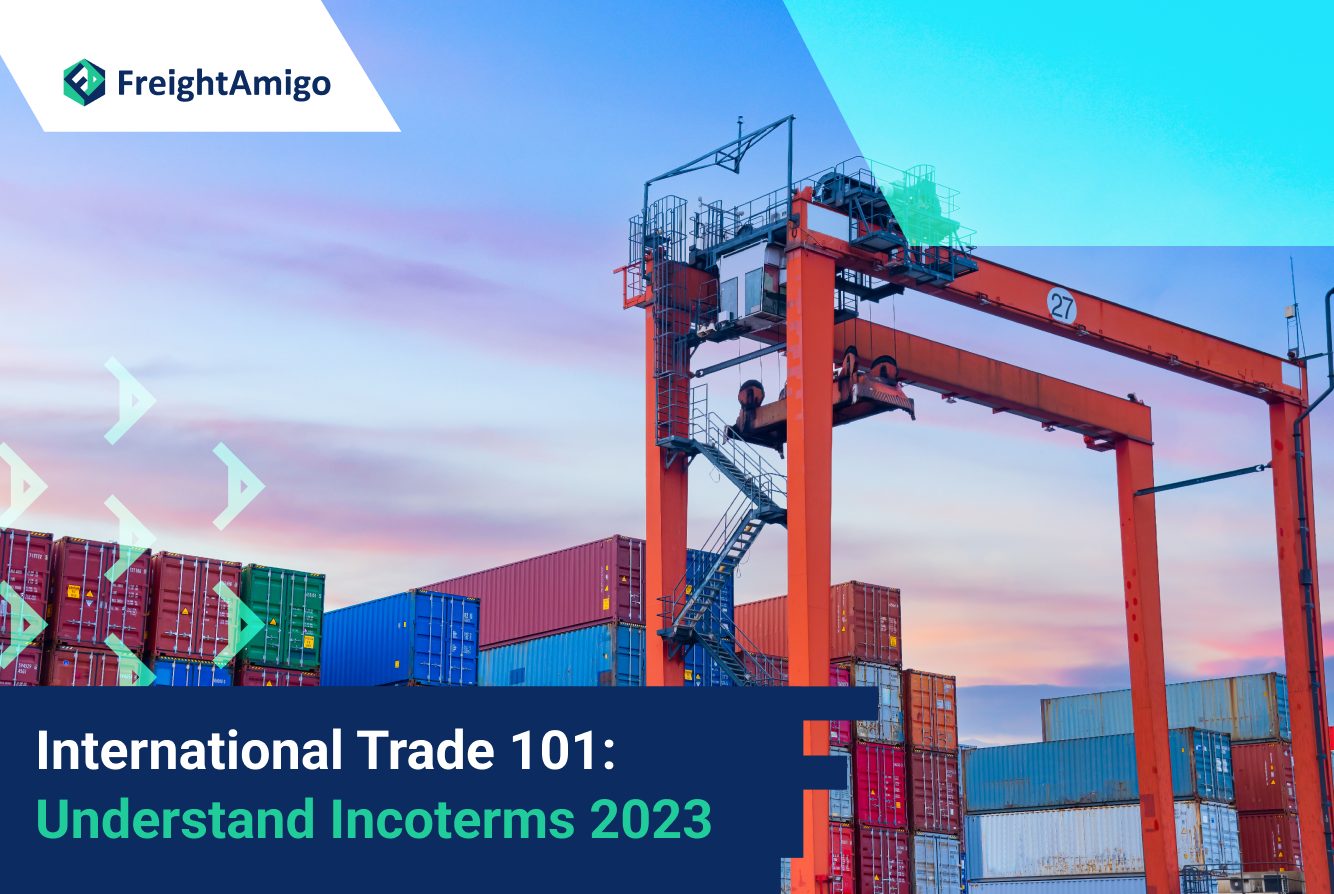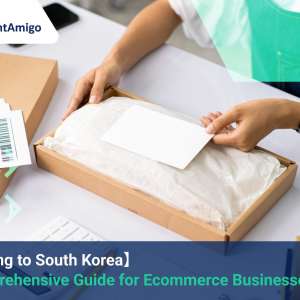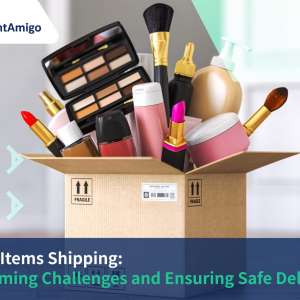Understanding Incoterms® 2023
International Trade 101
Latest update in January 2024 by Tiffany Lee – Marketing Analyst at FreightAmigo
Navigating the complex world of international trade can be overwhelming, especially when dealing with customs regulations and shipping responsibilities. That is why Incoterms® exist – to simplify and streamline global trade processes. In this comprehensive guide, we will explore what Incoterms® 2023 are, their significance in international commerce, and how they can benefit your business. Whether you are an importer or exporter, understanding Incoterms® is crucial for ensuring smooth and efficient transactions. So, let’s dive in!
Want to compare the best Express, Air Freight, Sea Freight, Rail Freight & Trucking rates so as to have better control on cost?
What are Incoterms®?
Incoterms® are globally recognized agreements that define the responsibilities of buyers and sellers during international shipping. Developed by the International Chamber of Commerce (ICC), Incoterms® provide a standardized framework for trade, ensuring clarity and reducing misunderstandings. These terms outline who is responsible for various aspects of the shipping process, such as transportation, insurance, and customs clearance. By using Incoterms®, businesses can establish clear expectations and allocate responsibilities, ultimately facilitating smoother transactions and minimizing disputes.
The Latest Incoterms® 2023
The International Chamber of Commerce regularly updates Incoterms® to reflect changes in global trade practices and legislation. The most recent version, Incoterms® 2023, was released to address emerging trends and challenges in international commerce. While the specific details of Incoterms® 2023 are beyond the scope of this guide, it is important to stay informed about the latest updates. Familiarizing yourself with the changes and consulting legal experts can help you navigate the evolving landscape of international trade effectively.
Incoterms® and Their Definitions
Incoterms® consist of a set of rules that define the responsibilities of buyers and sellers. These rules cover various aspects of the shipping process, including delivery, transportation, insurance, and risk transfer. Here is a breakdown of the most used Incoterms®:
EXW (Ex Works)
EXW is an Incoterm where the seller makes the goods available at their premises, and the buyer is responsible for collecting them. The seller has no obligation for transportation or associated costs. In this arrangement, the buyer assumes full responsibility for the goods from the seller’s premises to the destination.
FCA (Free Carrier)
FCA is an Incoterm where the seller delivers the goods, cleared for export and packaged, to a specified location. The buyer is responsible for arranging and paying for transportation and insurance from that point onwards. FCA is often used when goods are transported via multiple modes of transport.
CPT (Carriage Paid To)
CPT is an Incoterm where the seller agrees to pay for all transportation costs to a designated destination. Once the goods arrive at the specified location, the risk and costs transfer to the buyer. CPT is commonly used when goods are delivered directly to the buyer’s door.
CIP (Carriage and Insurance Paid To)
CIP is an Incoterm where the seller is responsible for transportation and insurance costs to a specified destination. The seller pays for all associated costs until the goods are delivered. Once delivered, the risk and responsibility transfer to the buyer. CIP is often used for goods transported by air or sea.
DAP (Delivered at Place)
DAP is an Incoterm where the seller delivers the goods at a named place, cleared for importation, but without unloading. The buyer assumes responsibility for unloading costs and any further transportation. DAP places more responsibility on the buyer compared to other Incoterms.
DPU (Delivered at Place Unloaded)
DPU is an Incoterm where the seller delivers the goods to a specified destination but is not responsible for unloading or additional costs. The buyer assumes the risk and responsibility for unloading the goods at their end. DPU is commonly used when the buyer has the necessary equipment and facilities for unloading.
DDP (Delivered Duty Paid)
DDP is an Incoterm where the seller is responsible for all costs, including customs duties and taxes, until the goods are delivered to a named destination. The buyer is responsible for unloading the goods at their end. DDP places the highest level of responsibility on the seller.
Four Incoterms® for Sea and Inland Waterway Transport
In addition to the seven Incoterms® applicable to any mode(s) of transport, there are four specific Incoterms® for sea and inland waterway transport:
- FAS (Free Alongside Ship) – The seller delivers the goods alongside a named vessel at the port of shipment. The buyer is responsible for loading, transportation, and insurance costs from that point onwards.
- FOB (Free on Board) – The seller delivers the goods on board a named vessel at the port of shipment. The buyer assumes responsibility for loading, transportation, and insurance costs from that point onwards.
- CFR (Cost and Freight) – The seller pays for all costs related to loading, transportation, and insurance up until delivery at a named port of destination. The risk transfers to the buyer once shipment has been made.
- CIF (Cost, Insurance and Freight) – The seller delivers the goods to a named port of destination and pays for all associated costs, including loading, transportation, and insurance. The buyer assumes responsibility for unloading the goods at their end.
Choosing the Right Incoterms® for Your Business
International trade is constantly evolving, with new regulations and practices emerging regularly. Selecting the appropriate Incoterms® for your business is crucial for ensuring smooth and efficient international trade. Consider factors such as the nature of your goods, transportation requirements, and the level of control you wish to retain. It’s also essential to communicate clearly with your trading partners and seek legal advice when necessary. By choosing the right Incoterms®, you can minimize risks, streamline operations, and establish mutually beneficial relationships with your international counterparts.
The International Chamber of Commerce (ICC) provides the most up-to-date information on Incoterms® and offers resources such as the official 2023 Incoterms® book. Additionally, seeking professional legal advice can help you navigate the complexities of international trade and ensure compliance with applicable laws and regulations.
Your Trusted International Trade Partner
Incoterms® are an indispensable tool for facilitating international trade. By providing standardized rules and definitions, Incoterms® promote clarity, reduce disputes, and streamline cross-border transactions. Whether you are an importer or exporter, understanding Incoterms® is essential for successful and efficient global trade. At FreightAmigo, we understand the challenges faced by importers and exporters in navigating the intricacies of international trade. With our expertise and comprehensive import and shipping services, we are your trusted partner in selecting the most suitable Incoterms® for your business. We prioritize transparency, eliminating any last-minute shipping surprises or unexpected costs. With FreightAmigo by your side, you can have peace of mind, knowing that your international transactions are in capable hands.
There are different options for cargo transportation. If you want to choose the most convenient and suitable solution, it is best to have the full support of logistics experts! If you are planning to ship goods overseas, please go to the FreightAmigo page for inquiries.
Read more:
【Logistic101】 CIP Meaning and Usage of Incoterms
【Logistic101】What is CPT?| Usage and reminders of Incoterms
Mastering International Trade: A Comprehensive Guide on DDP and DAP Incoterms
If you have any inquiries on logistics/supply chain, feel free to contact FreightAmigo now:
Chat with us online | Phone : +852 28121686 | WhatsApp: +852 27467829









































